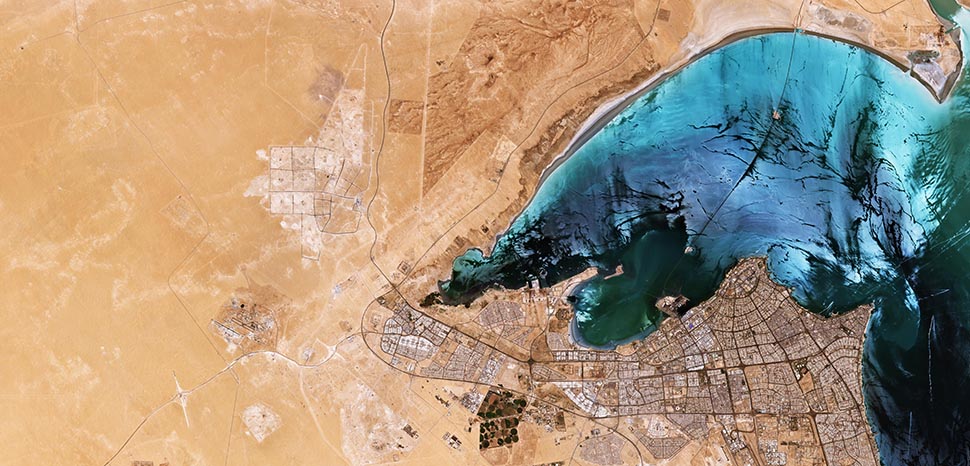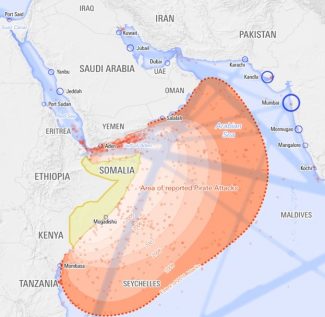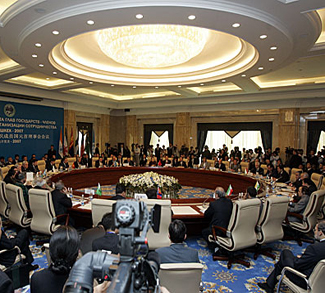On Monday, July 3, 2023, the Kuwaiti Minister of Oil, Saad Al Barrak, issued a statement expressing his rejection of what he described as “Iranian claims and measures” concerning the “Durra” field (as named by Kuwait and Saudi Arabia), a gas field in the sea, emphasizing that they “contradict the fundamental principles of international relations.” The minister recalled that “the field is a Kuwaiti-Saudi natural resource, and no other party has any rights to it until the maritime boundaries are delineated.” On the following day, July 4, the Saudi Ministry of Foreign Affairs issued a statement supporting Kuwait and affirming that “only two nations have sovereign rights to exploit the resources of this region.” These Saudi and Kuwaiti positions followed Tehran’s declared intentions to take actions concerning the “Arash” field (as named by Iran) and its intention to begin exploitation of the shared gas and oil field.
Arash/Durra Field: An Energy Treasure at Sea
The dispute between the parties revolves around a field with an undefined energy value. Reuters reported that reserves are estimated at one trillion cubic feet of natural gas, of which 200 billion cubic feet are likely to be extracted immediately, in addition to over 310 million barrels of oil. Some energy experts estimate that the reserves of the Durra field approach 11 trillion cubic feet of natural gas and about 300 million barrels of oil and oil condensates. These figures are of significant importance to the Kuwaiti side, as considering Kuwait’s natural gas reserves, which do not exceed 35 trillion cubic meters, the hydrocarbon value of the field could increase Kuwait’s reserves by 30%.
Historical Conflict
The dispute dates back to the 1960s when Kuwait and Iran had overlapping maritime concessions due to undefined maritime boundaries at the time. Iran granted the Anglo-Iranian Oil Company the right to explore and exploit, while Kuwait granted rights to the Royal Dutch Shell company. The concessions overlapped in the northern part of the field.
Over time, Kuwait strengthened its position by signing a memorandum of understanding with Saudi Arabia in December 2019, providing for cooperation between the two countries through Al Khafji Joint Operations for the development and exploitation of the field. Both countries began implementing the memorandum of understanding after reaching an agreement on March 21, 2022, to begin work by selecting consulting firms to conduct necessary engineering studies for the field’s development and devising technically efficient designs in terms of capital and operation.
Five days later, on March 26, 2022, the spokesman for the Iranian Ministry of Foreign Affairs, Saeed Khatibzadeh, stated that “some parts of the field are located in the border waters between Iran and Kuwait, and his country reserves the right to exploit and invest in this region.” For this reason, Tehran considered the signed document “illegal” as it pertains to the field and should be associated with any operation of exploitation and development.
Negotiations with No Results
So far, rounds of dialogue aimed at delimiting the maritime boundaries between the two countries have failed, including a round of talks in 2000, where Iran attempted to exploit the process and commence development of the field. However, Kuwait had threatened at the time to take the matter to international courts, prompting Tehran to halt its development operations.
In April 2022, Saudi Arabia and Kuwait invited Iran to negotiate over the field, stating in a joint statement from the Saudi and Kuwaiti Ministries of Foreign Affairs that they renew, as unified stakeholders, the invitation to Iran to delimit the eastern borders of the common region shared between the two Gulf countries.
Kuwait is aware of Iran’s hidden aspiration to negotiate unilaterally, which the country strongly refuses. What is noteworthy in this matter concerning the delimitation of borders between the three parties is that the borders between Saudi Arabia and Iran have been delineated, while the borders between Iran and Kuwait remain a subject of bilateral dispute. Therefore, Iran insists on negotiating with Kuwait alone as long as it represents the only reluctant party within the Saudi-Kuwaiti duo. This hypothesis is reinforced by Iran’s diplomatic movements. In May 2022, Iran’s ambassador to Kuwait, Mohammad Irani, stated that his country had sent an official invitation to the Kuwaiti side to “resume discussions between the two countries that had stopped in 2014.”
Following this prior awareness, if one may say, from the Kuwaiti side in particular, and due to a series of regional and international geopolitical changes, we can understand the attachment of the Kuwaiti-Saudi side to a unified position of “we jointly represent a single negotiating party.”
In light of this hypothesis, several questions arise: Did Iran use the factor of normalizing relations with Saudi Arabia to negotiate with Kuwait in isolation? Did Iran use the card of the prior delineation of its maritime borders with Saudi Arabia to exert pressure on Kuwait? And if so, is Iran underestimating or neglecting the fact that addressing Gulf issues necessarily requires the involvement of Saudi Arabia as a principal party?
An Unexpected Geopolitical Move
In examining the previous positions of the Iranian actor regarding this issue, it was expected that Iran would claim “its rights.” However, the timing of this action, just weeks after the normalization of diplomatic relations with Saudi Arabia, has led to various interpretations and questions about the primary motive that prompted Iran to reaffirm this historical stance on one hand, and the relationship with the internal structural changes taking place in Iran on the other hand.
The debate on the change within the Iranian management structure is directly related to the resignation or dismissal of Ali Shamkhani from the Secretaryship of Iran’s Supreme National Security Council. Several questions have been raised regarding the implications and dimensions of this change, which occurred at a sensitive time for Iran, given Shamkhani’s significant role in improving Iranian relations with its Arab environment, as well as the role of this position in defining the Council’s directions as a center of Iranian decision-making in domestic and foreign policies.
Although the Secretary of the Supreme National Security Council does not have the legal and practical power to make decisions alone, they have decision-making capabilities as they are responsible for managing its affairs and overseeing the proper implementation of resolutions and decisions made by the Council, as well as being responsible for administrative and executive matters. While some Arab analyses have excluded the possibility of a direct or indirect link with Iranian statements in the gas field, this factor should remain on the table as it concerns a personality who played a central role in the return of relations with the Arab environment on one side, and a council that carries its weight in foreign policy on the other.
Gas Field and Barometer
The Durra/Arash field not only plays the role of an energy dispute between the two parties but also serves as a barometer in international relations. In other words, the Durra/Arash field currently acts as an evaluation tool for bilateral relations, especially between Saudi Arabia and Iran. The ongoing conflict will allow Riyadh and Tehran to determine to what extent each party is capable of peacefully and diplomatically resolving pending issues. First, it will let Saudi decision-makers understand the extent to which Iran will abandon its old approach on the one hand and attempt to solve the problem on the other. Second, it will allow Iran to prove that the new government has genuinely changed its policy of interference with its Arab environment and demonstrate a policy based on the principle of good neighborliness.
Looking Ahead
After a series of official statements from the Kuwaiti and Saudi sides, Tehran expressed its position on July 12 regarding the new developments through the Iranian Ministry of Foreign Affairs spokesperson. In the statement, it was mentioned that “issues related to delineating maritime borders and exploiting common hydrocarbon resources, while taking into account common interests and the principle of good neighborliness with all neighbors, including Kuwait, have always been of interest to the Islamic Republic of Iran.”
The statement from the Ministry of Foreign Affairs spokesperson offers some indications of the possibility of a diplomatic resolution to this matter by Tehran. Concerning the Kuwaiti side, there is a strong insistence on the issue of the “exclusivity” of exploitation rights in the field and the rejection of any Iranian involvement before delineating borders, while Saudi Arabia repeatedly emphasizes that it, along with Kuwait, is a single negotiating party and at the same time invites Iran to negotiate.
The fate of this matter, according to a personal analysis, depends on the “ability of Saudi Arabia to influence,” given that it currently represents a link between Kuwait and Iran. In other words, considering the solid relationship between Saudi Arabia and Kuwait, and the fact that Iran has restored diplomatic relations with Saudi Arabia, the “ability of Saudi Arabia to influence” lies in its capacity to find common ground between Kuwait and Iran.
Based on a geopolitical analysis of the regional reality the region, we could say that Saudi Arabia has the opportunity to prove its role as a classic leader within the Gulf Cooperation Council (GCC) in the first place, evaluate the new aspect of its relations with Iran in the second place, and remind Iran that restoring diplomatic relations does not necessarily imply a change in position on certain sovereignty issues in the third place. As for Iran, it must realize that it has adopted a “good neighborliness” approach and that any future move will be measured according to this standard, as the history of interference in the internal affairs of states, which has characterized its foreign policy since the beginning of the current millennium, remains in people’s minds. As for Kuwait, a state that favors mediation and peace, it remains caught between the bet of “exclusive rights” and the anvil of “border delineation,” waiting for the balance to tilt in favor of one or the other, depending on regional and relational considerations above all.
The views expressed in this article belong to the authors alone and do not necessarily reflect those of Geopoliticalmonitor.com.




